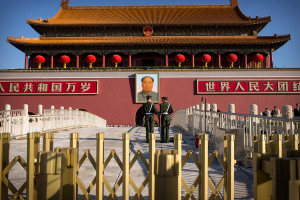 By JAVIER C. HERNÁNDEZ October 22, 2015
By JAVIER C. HERNÁNDEZ October 22, 2015
Guards changing shifts beneath the portrait of the former Chinese leader Mao Zedong at Tiananmen Gate in Beijing after a flag-raising ceremony this month.
Mark Schiefelbein/Associated Press
HONG KONG — Karla Cabrera, a 29-year-old lawyer in Mexico City, was excited when she came across “Introduction to Mao Zedong Thought,” an online course about the Chinese revolutionary leader. She has a passion for Chinese history, and she hoped the class would shed light on the brutal political battles that took place under Mao’s rule.
But when Ms. Cabrera began watching the lectures on edX, a popular online education platform owned and administered by Harvard and the Massachusetts Institute of Technology, she was disappointed.
A propaganda poster depicting Mao Zedong waving to the masses over the slogan “Long live the victory of Chairman Mao’s Revolution.”
Each class opened with a patriotic video montage. Talk of Mao’s errors was minimal, restricted to the Communist Party line. The professor, a faculty member at Tsinghua, one of China’s most prestigious universities, seemed eager to mimic Mao himself, dressing in a tunic suit and referring to Maoism as a “magic bullet” for the party.
“It was like watching propaganda,” Ms. Cabrera said in a telephone interview. “They just told you what they wanted you to know.”
As China seeks to extend its global clout, it has gone to great lengths in recent years to promote its culture and values abroad, building vast media operations overseas and opening hundreds of language and cultural outposts.
Now it is turning to a new tool: online education, a rapidly growing industry that promises access to millions of students and the endorsement of some of the world’s most renowned institutions.
When “Introduction to Mao Zedong Thought,” taught by Feng Wuzhong, an associate professor at Tsinghua’s School of Marxism, made its debut last month, it quickly found a large audience, attracting about 3,100 students from 125 countries, including more than 700 from the United States.
The course is one of more than a hundred offered on edX and other top education platforms by mainland Chinese universities. There are classes on philosophy, architecture and computer science, but also a handful on subjects deemed politically sensitive in China, such as international relations or law, in which Chinese professors must adhere to the party’s views.
Aiming to expand their offerings and draw a global audience, Chinese universities are spending hundreds of thousands of dollars on sleek videos and translations. They are advising instructors to abandon dull lecturing styles. And they are coaching professors on how to deal with foreign students, telling them to embrace open discussion and dissent.
But the effort faces significant challenges, most notably convincing overseas students that their courses are intellectually compelling and rigorous, despite China’s strict limits on academic freedom. It also puts online education providers in a difficult position, forcing them to strike a balance between preserving academic freedom and maintaining high standards for thousands of courses.
Yong Zhao, an education professor at the University of Oregon, compared China’s push in online education to its efforts to build an international following for its flagship news network, CCTV, over the past decade.
“China has been on the receiving end of education for a long time, and now it has a big opportunity,” Professor Zhao said. “The question is, can it really reach anybody? Does it have the same credentials, quality and authenticity?”
Under President Xi Jinping, Chinese universities have faced enormous pressure to build programs that rival those of the great institutions of the West. At the same time, government officials have urged universities to promote Chinese values, by discouraging the use of Western textbooks, for example, and offering more courses on thinkers like Confucius and Marx.
For many universities, online education provides a way to achieve both those objectives.
“Putting courses on international platforms can help promote Chinese culture,” said Shi Xuelin, who oversees the online curriculum for Tsinghua. “It also helps boost the school’s reputation.”
China’s top universities have forged ties with several leading online education providers based in the United States, including edX and Coursera, to bring their offerings to millions of users, joining the ranks of schools like Columbia, Princeton and Yale. The courses are generally free, though some schools offer the option of paying a fee for a certificate of completion. The Chinese courses are typically taught in Mandarin but with English subtitles.
Xi’an Jiaotong University provides a course on Chinese philosophy. Nanjing University has started a class on the Jewish diaspora in China. Shanghai Jiao Tong University is promoting a course on Chinese medicine and traditional culture.
Over the summer, Tsinghua presented a course on Chinese politics and economics titled, “Will China Rise as a Disruptive Force? The Insiders’ Perspective.”
When edX approached Tsinghua about offering a class on heroes in Chinese culture, university officials suggested a course on Mao and socialism, a requirement in Chinese universities that many students loathe for its brittle pronouncements on party thought. The course is not about Mao’s life, but rather his political theories, a form of Marxism that the party honors as a guiding ideology, but that most Chinese, including officials, all but ignore as irrelevant.
Professor Feng devised a condensed version of that course, broken into four chapters that cover topics like Marxism and revolutionary theory. The online course provides a discussion forum. Tests are administered regularly. Those who pass are granted a certificate of completion.
For detail please visit here
